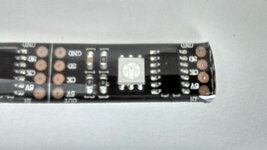// Uncomment this line if you have any interrupts that are changing pins - this causes the library to be a little bit more cautious
// #define FAST_SPI_INTERRUPTS_WRITE_PINS 1
// Uncomment this line to force always using software, instead of hardware, SPI (why?)
// #define FORCE_SOFTWARE_SPI 1
// Uncomment this line if you want to talk to DMX controllers
// #define FASTSPI_USE_DMX_SIMPLE 1
#include "FastSPI_LED2.h"
////////////////////////////////////////////////////////////////////////////////////////////////////
//
// test code
//
//////////////////////////////////////////////////
#define NUM_LEDS 50
struct CRGB leds[NUM_LEDS];
void setup() {
// sanity check delay - allows reprogramming if accidently blowing power w/leds
delay(2000);
// For safety (to prevent too high of a power draw), the test case defaults to
// setting brightness to 25% brightness
LEDS.setBrightness(64);
// LEDS.addLeds<WS2811, 13>(leds, NUM_LEDS);
// LEDS.addLeds<TM1809, 13>(leds, NUM_LEDS);
// LEDS.addLeds<UCS1903, 13>(leds, NUM_LEDS);
// LEDS.addLeds<TM1803, 13>(leds, NUM_LEDS);
LEDS.addLeds<LPD8806>(leds, NUM_LEDS)->clearLeds(300);
// LEDS.addLeds<WS2801>(leds, NUM_LEDS);
// LEDS.addLeds<SM16716>(leds, NUM_LEDS);
// LEDS.addLeds<WS2811, 11>(leds, NUM_LEDS);
// Put ws2801 strip on the hardware SPI pins with a BGR ordering of rgb and limited to a 1Mhz data rate
// LEDS.addLeds<WS2801, 11, 13, BGR, DATA_RATE_MHZ(1)>(leds, NUM_LEDS);
// LEDS.addLeds<LPD8806, 10, 11>(leds, NUM_LEDS);
// LEDS.addLeds<WS2811, 13, BRG>(leds, NUM_LEDS);
// LEDS.addLeds<LPD8806, BGR>(leds, NUM_LEDS);
}
void loop() {
for(int i = 0; i < 3; i++) {
for(int iLed = 0; iLed < NUM_LEDS; iLed++) {
memset(leds, 0, NUM_LEDS * sizeof(struct CRGB));
switch(i) {
// You can access the rgb values by field r, g, b
case 0: leds[iLed].r = 128; break;
// or by indexing into the led (r==0, g==1, b==2)
case 1: leds[iLed][i] = 128; break;
// or by setting the rgb values for the pixel all at once
case 2: leds[iLed] = CRGB(0, 0, 128); break;
}
// and now, show your led array!
LEDS.show();
delay(10);
}
// fade up
for(int x = 0; x < 128; x++) {
// The showColor method sets all the leds in the strip to the same color
LEDS.showColor(CRGB(x, 0, 0));
delay(10);
}
// fade down
for(int x = 128; x >= 0; x--) {
LEDS.showColor(CRGB(x, 0, 0));
delay(10);
}
// let's fade up by scaling the brightness
for(int scale = 0; scale < 128; scale++) {
LEDS.showColor(CRGB(0, 128, 0), scale);
delay(10);
}
// let's fade down by scaling the brightness
for(int scale = 128; scale > 0; scale--) {
LEDS.showColor(CRGB(0, 128, 0), scale);
delay(10);
}
}
}







